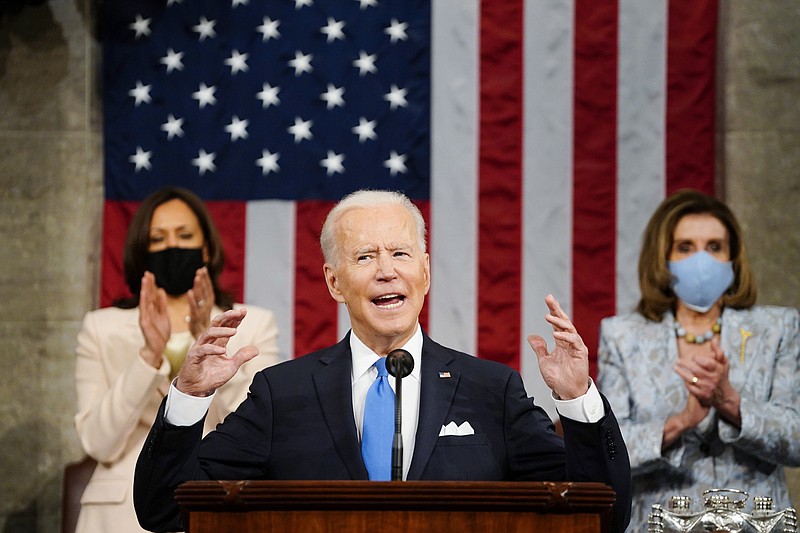WASHINGTON (AP) - President Joe Biden declared Wednesday night in his first address to a joint session of Congress that "America is rising anew" and pointed optimistically to the nation's emergence from the pandemic as a vital moment to rebuild the U.S. economy and fundamentally transform government roles in American life.
Biden marked his first 100 days in office as the nation pushes out of a mix of crises, making his case before a pared-down gathering of mask-wearing legislators because of pandemic restrictions.
Speaking in highly personal terms while demanding massive structural changes, the president urged a $1.8 trillion investment in children, families and education to help rebuild an economy devastated by the virus and compete with rising global competitors.
He speech took place in a setting unlike any other presidential address in the familiar venue, with the U.S. Capitol still surrounded by fencing after the building was stormed in January by insurrectionists protesting his election. The nationally televised ritual of a president standing before Congress for the first time was one of the most watched moments of Biden's presidency so far, a chance to sell his plans to voters of both parties, even if Republican lawmakers prove resistant.
"America is ready for takeoff. We are working again. Dreaming again. Discovering again. Leading the world again. We have shown each other and the world: There is no quit in America," Biden said.
"I can report to the nation: America is on the move again," he said. "Turning peril into possibility. Crisis into opportunity. Setback into strength."
This year's scene at the front of the House chamber had a historic look: For the first time, a female vice president, Kamala Harris, was seated behind the chief executive. And she was next to another woman, House Speaker Nancy Pelosi.
The first ovation came as Biden greeted, "Madam Vice President." He added "No president has ever said those words from this podium, and it's about time."
The scene was familiar yet strange, with members of Congress spread out, a sole Supreme Court justice in attendance and many Republicans absent citing "scheduling conflicts." There was no need for a "designated survivor," with so many Cabinet members not there, and the chamber was so sparsely populated that individual claps could be heard echoing off the walls.
Biden was upbeat and forceful.
"I have never been more confident or more optimistic about America," he said. "We have stared into an abyss of insurrection and autocracy - of pandemic and pain - and 'We the People' did not flinch."
He repeatedly hammered home how his plans would put Americans back to work, restoring millions of jobs lost to the virus. He laid out a sweeping proposal for universal preschool, two years of free community college, $225 billion for child care and monthly payments of at least $250 to parents. His ideas target frailties that were uncovered by the pandemic, and he argues that that economic growth will best come from taxing the rich to help the middle class and the poor.
For Biden, whose moment has been nearly a half century in the making, his speech also provided an update on combating the COVID-19 crisis he was elected to tame, showcasing hundreds of millions of vaccinations and relief checks delivered to help offset the devastation wrought by a virus that has killed more than 573,000 people in the United States. He also championed his $2.3 trillion infrastructure plan, a staggering figure to be financed by higher taxes on corporations.
Sen. Tim Scott, of South Carolina, said in the Republicans' designated response Biden was claiming too much credit in fighting the pandemic and reviving the economy.
"This administration inherited a tide that had already turned," Scott said. "The coronavirus is on the run."
Biden has embraced major action over incremental change. But he will be forced to thread a needle between Republicans who cry government overreach and some Democrats who fear he won't go big enough.
The Democratic president's strategy is to sidestep polarization and appeal directly to voters. His prime-time speech underscored a trio of central campaign promises: to manage the deadly pandemic, to turn down the tension in Washington in the aftermath of the insurrection and to restore faith in government as an effective force for good.
Biden also was addressing an issue rarely confronted by an American president, namely to compete with autocracies like China, the nation needs "to prove that democracy still works" after his predecessor's baseless claims of election fraud and the ensuing attack on the U.S. Capitol.
No American politician has more familiarity with the presidential address to Congress than Biden. He spent three decades in the audience as a senator and eight years as vice president seated behind President Barack Obama during the annual address.
Yet, the desire for swift action is born from political necessity. Biden understands the time for passing his agenda could be perilously short given presidents' parties historically lose congressional seats in the midterm elections, less than two years away. The Democrats' margins are already razor-thin.

